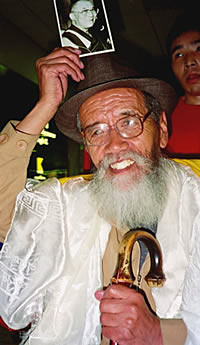
Takna Jigme Sangpo arrives in Washington, D.C., on July 13. He holds an image of the Dalai Lama above his head, an act of reverence that would not be allowed in Chinese-occupied Tibet.
Jigme Sangpo was met at O’Hare Airport in Chicago by a family member and soon afterwards, spoke by phone to Prof. Samdhong Rinpoche, cabinet head of the Tibetan government in exile, and Lodi Gyari, Special Envoy of His Holiness the Dalai Lama.
Samdhong Rinpoche expressed his personal greetings to Jigme Sangpo and urged him to take sufficient rest. Lodi Gyari welcomed him to freedom on behalf of the Dalai Lama, whom he had informed of the release.
“The Chinese, in allowing Takna Jigme Sangpo to travel to the United States for medical treatment, are making a positive gesture,” Gyari said.
Jigme Sangpo, a former primary school teacher, was first arrested for political activities in the 1960s and has spent most of the past 40 years in prison, where he was highly respected by other political prisoners for his determination and considered to be a great Tibetan patriot. There had been serious concern for his health in prison for several years.
“We celebrate Jigme Sangpo’s arrival in Washington as the end of a long campaign for his release, but our happiness is tempered with regret for all those who continue to suffer injustices and the denial of basic freedoms in Tibet, and certainly those who remain imprisoned for their political and religious beliefs,” said Mary Beth Markey, Executive Director of the International Campaign for Tibet (ICT).
“ICT welcomes his release as an indication of Beijing’s sensitivity to sustained government and NGO advocacy for the release of Tibetans held for ‘counter-revolutionary’ and other political charges,” Markey continued.
“Beijing has clearly decided that the early release of a few high-profile Tibetan political prisoners is in its best interest. But these recent releases may more accurately reflect the implementation of the government’s stated “Tibet-Related External Propaganda” campaign then any significant change in repressive system Tibetans must face.”
“The underlying political system that withholds basic human rights from Tibetans endures – if these same individuals were to engage in non-violent dissent today, the reaction would be the same and they would face the same harsh sentences. A just system would reflect the interests of both Tibetans and Chinese and can be arrived at through dialogue between the Chinese leadership and the Dalai Lama or his representatives,” said Markey.

